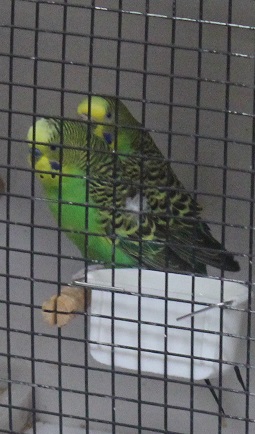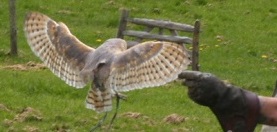COURSE STRUCTURE AND CONTENT
Course Duration: 100 hours of self-paced study
Start Date: Start at any time - study at a pace that suits you, and with full tutor support for the duration of your studies if you want it. You can interact in many ways, or you may prefer working through the course on your own. It's up to you.
Lessons: The course comprises 8 lessons as detailed below. Each lesson should requires reading, additional research, completing set tasks, online self-assessments and preparing your assignments for submission.
Examination: optional (fee applies).
LESSONS: WHAT YOU WILL COVER
Lesson 1. Scope and Nature of Bird Care
- Introduction.
- Selection.
- Grooming.
- Hygiene.
- Terminology.
Lesson 2.Breeds
- Bird types.
- Choosing a bird.
- Commonly kept birds.
Lesson 3. Housing Birds
- Aviaries.
- Minimum requirements for keeping birds.
- Water, feeding and stimulation equipment.
Lesson 4. Feed and Nutrition
- Feed and feeding.
- Watering.
- Nutritional requirements.
Lesson 5. Health Management
- Caring for the sick bird.
- Safety on the home.
- Traveling.
Lesson 6. Bird Behaviour and Training
- Catching/restraining.
- Behaviour.
- Training.
Lesson 7. Breeding
- Sexing and Desexing.
- Breeding.
- Welfare.
- Reproduction.
- Neo-natal care.
Lesson 8. Working in the Bird Industry
- Pet trade and breeding.
- Showing.
- Avian Health.
- Pigeon racing.
- Falconry.
- Zoos and Wildlife Parks.
- Avian tourism.
- Farming birds for meat, eggs, feathers or oils.
- Birds for pest control.
- Bird fertilizer - manure.
Each lesson is completed with an assignment which the student submits to the school. This will be marked by your tutor and returned to you with any relevant comments or guidance.
AIMS: WHAT YOU WILL LEARN
- Discuss the nature and scope of aviculture and develop networking with others involved with aviculture.
- Determine appropriate types of birds to keep for different purposes.
- To consider and choose appropriate housing for a range of different types of captive birds.
- Outline the feeding requirements of a range of different captive birds.
- Describe management techniques for the health of a range of different birds.
- Appreciate behavioural traits of any birds you keep, and understand how to properly manage and respond to those traits; and if so desired, train the birds you keep.
- Manage the breeding of different types of birds.
TASKS: HOW YOU WILL LEARN
 Consider 4 specific areas of bird care. For example, one area may be feeding and nutrition. Find out about the products and services which are available in your locality for each area you chose.
Consider 4 specific areas of bird care. For example, one area may be feeding and nutrition. Find out about the products and services which are available in your locality for each area you chose.- Research up to 3 birds native to your country: Aim to find out as much as you can about their former and current uses if any.
In the event you cannot find information about native breeds (of any species), you should aim to find out about introduced species - the reasons for their introduction and where they originated from.
- Research the range of housing options for any type of birds you are specifically interested in.
- From your research estimate the total cost of setting up a new housing system. Include nesting, feeding, watering, lighting, temperature control and ventilation in your design.
- Visit or contact a feed supplies shop or pet shop and evaluate the various feeds sold to bird keepers. Consider cost versus nutritional quality in your assessment.
For this activity you should aim to focus your attention on feed that is specifically designed for a species of your choice e.g. pigeons.
- Connect with at least 2 bird owners who have birds with former or ongoing illness. Discuss with them the illness and the treatments which the bird undergoes. Ask questions about the how the illness affects the birds overall well-being. Ask about the nature of the illness and the long term management of the illness.
- Observe a bird in its natural habitat. Consider its interactions with any other birds which were nearby at the time. Take notes on how the birds interact or any other noticeable behaviours of birds.
If it is not possible to complete this task observing birds in real life – watch online video(s) to complete this observation of behaviour activity.
- Consider welfare when breeding birds either in captivity or in their natural habitats. You should find an approved captive breeding program which is of particular interest to you. Take notes or record as much information as possible about the program. An example of a bird species in an intensive breeding program may be the Orange Bellied Parrot or the Corncrake.
- Consider specifically the individual health and welfare of the breeding pairs - the lack of knowledge of human populations and the possible impacts on breeding programs in natural environments, e.g. habitat destruction.
- Using websites which advertise available positions search under animal related jobs, find at least three roles which require knowledge of bird care and/or management.
Examine the roles and find out what qualifications (if any) are needed to successfully meet the application criteria for each.
WHY PEOPLE KEEP BEAUTIFUL BIRDS!
In some countries birds are an extremely popular pet.
They are also kept for more practical reasons: farmed for eggs and meat, used as messenger or racing birds (e.g. pigeons), or trained for hunting (i.e. falconry).
Pigeon Racing
Pigeon racing has been a much loved sport across many countries for many years, and today still continues to thrive. Although many animal welfare campaigns believe the sport should be banned due to the welfare of the birds, and many of birds not making it back home.
The racing of pigeons consists of keeping specifically bred birds (these are not wild pigeons), and training them correctly to be released to then race back to their home loft. Nowadays, this can be achieved by either owning your own loft (which can be quite expensive), or you can use an existent loft which you then pay the manager there to look after the birds.
Keeping pigeons, like all birds, should be completed properly with the bird’s health and welfare in mind. All birds will be required to have regular vaccines, worm and flea treatments, and also full health checks to ensure there is low risk of disease. Proper husbandry must be undertaken as with the correct nutrition and care.
Falconry

There are a number of falconry attractions across the globe, with possible employment opportunities. Not only are these birds used for entertainment, but can also be used for pest control and sport. You will be working outdoors most of the time, caring for and training the birds. Everyday tasks will include; feeding, preparation of meals, weighing of birds, cleaning of cages and equipment, training the birds to the lead, flying the bird for exercise, presenting the birds well to viewers or for pest control.
Depending on the area of the world, there are a number of laws and regulations you must comply with and it is worthwhile researching these prior to working in, or owning a falconry business.
Birds of prey require specific care and handling, and will need to be trained to a very high standard. It is always a good idea to work alongside someone who had a vast amount of experience in handling these birds, and should never be done on your own as a beginner.
Zoos and Wildlife Parks
Bird collections are found in most zoos; and zookeepers are needed to manage the birds in those collections. Zoos have multiple purposes: animal conservation, education, ecotourism. The people who work in zoos therefore also need to multiple purposes, which may at times seem to be conflicting purposes.
Avian Tourism
Bird watching (birding) is a significant pass time. The serious birdwatcher or ‘tweeter’ may travel significant distances, to see birds in the wild or in captivity. Safaris are becoming increasingly popular as are Avian conferences and conservation. Some parks maintain collections of birds specifically to attract bird watchers. Bird watching tourism is a relatively new industry that is growing quite rapidly in many of the world’s regions including Australia, Africa, USA, India and so on.
WHAT IT IS LIKE TO STUDY WITH US
You can start the course at any time.
It is studied by distance learning, so you can study in the comfort of your own home. But this doesn't mean you are all alone in your studies. Our highly qualified and friendly tutors are there to help you every step of the way. If you have any questions at all, they are always happy to help.
WHY DO THIS COURSE?
- Learn all about the keeping of birds - the different types of birds suitable for keeping, their housing, nutrition, and much more.
- Suitable for those looking to keep birds, breed birds, or working in the bird industry.
The course is perfect for:
-
Animal rehabilitation or rescue such as RSPCA.
- Veterinarian services.
- Animal or land based education.
- Pet training and services.
- Bird showing.
- Bird breeding.
- Aviculture special interest groups or wildlife conservation.
- Birdwatching events or tourist linked groups e.g. bird of prey demonstration.
Learn the facts about bird keeping and the potential for increased vitality and improvements in their general health.
Bring new and innovative techniques to your care for birds – get the best out of them and make caring for birds a pleasure!
ARE YOU THINKING WHAT NEXT?
It may only take you a few minutes or hours to decide to take this course. You will reap the rewards of the knowledge and enjoyment gained from studying this Bird Keeping course for years to come! You can enrol on the course today!
If you have any questions or would like to know more, please get in touch with us using our Free Course Counselling Service. We will be happy to help you.